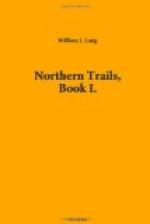More interesting to the wolves in these glad days than the game or the storehouse, or the piles of caplin which they cached under the sand on the shore, were the wandering herds of caribou,—splendid old stags with massive antlers, and long-legged, inquisitive fawns trotting after the sleek cows, whose heads carried small pointed horns, more deadly by far than the stags’ cumbersome antlers. Wherever the wolves went they crossed the trails of these wanderers swarming out of the thickets, sometimes by twos and threes, and again in straggling, endless lines converging upon the vast open barrens where the caribou gathered to select their mates for another year. Where they all came from was a mystery that filled the cubs’ heads with constant wonder. During the summer you see little of them,—here a cow with her fawn hiding deep in the cover, there a big stag standing out like a watchman on the mountain top; but when the early autumn comes they are everywhere, crossing rivers and lakes at regular points, and following deep paths which their ancestors have followed for countless generations.
The cows and fawns seemed gentle and harmless enough, though their very numbers filled the young wolves with a certain awe. After their first lesson it would have been easy enough for the cubs to have killed all they wanted and to grow fat and lazy as the bears, which were now stuffing themselves before going off to sleep for the winter; but the old mother wolf held them firmly in check, for with plenty of small game everywhere, all wolves are minded to go quietly about their own business and let the caribou follow their own ways. When October came it brought the big stags into the open,—splendid, imposing beasts, with swollen necks and fierce red eyes and long white manes tossing in the wind. Then the wolves had to stand aside; for the stags roamed over all the land, pawing the moss in fury, bellowing their hoarse challenge, and charging like a whirlwind upon every living thing that crossed their paths.




